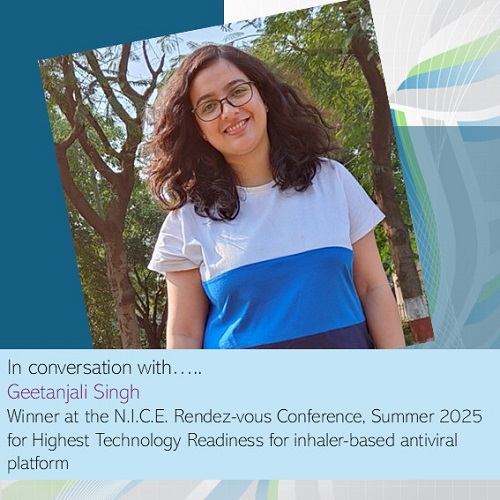
In conversation with....
Geetanjali Singh
Winner: Highest Technology Readiness Level N.I.C.E. Rendez-vous Conference, Summer 2025.
MFCEM: Hi Geetanjali, hearty congratulations to you and your mentors Profs. Sandeep Verma and Adam Mechler, on your win at the N.I.C.E. Rendez-vous Conference. Could you briefly tell us about this recognition and the innovation /technology for which you were recognized. How do you intend to take this technology forward from here?
Geetanjali Singh: Thank you very much for the kind words and encouragement!
This recognition was for our work on developing an inhaler-based antiviral platform aimed at providing an early line of defense against respiratory viral infections. During the COVID-19 pandemic, working with live virus posed significant biosafety challenges. To overcome this, we collaborated with researchers at NUS Singapore to create virus-like particles (VLPs) — non-infectious mimics of SARS-CoV-2 that retain its structural and surface properties.
Using Quartz Crystal Microbalance (QCM) and Dynamic Light Scattering (DLS), we studied how antimicrobial peptides (AMPs) such as Aurein 1.2 and Citropin 1.1 interact with these particles. The peptides showed strong and irreversible binding, suggesting their potential to block or neutralize the virus.
Building on this, we are now working toward translating this into a peptide-based inhaler therapy that can deliver these molecules directly to the lungs — with the goal of neutralizing the virus at its entry point. Our next steps involve optimizing the formulation for delivery efficiency and testing its efficacy in relevant biological models.
MFCEM: How do you and the team intend to take this technology forward from here?
Geetanjali Singh: Moving forward, we aim to translate this proof-of-concept into a deployable inhaler-based antiviral therapy. Each of our collaborating institutions brings unique strengths that will be crucial in advancing the technology.
At IIT Kanpur, we are focusing on peptide design, formulation, and biochemical characterization, leveraging our expertise in medicinal chemistry and molecular design to enhance the peptides’ stability and delivery efficiency. La Trobe University provides advanced biophysical and materials characterization facilities, which are essential for understanding peptide–membrane interactions and optimizing the delivery mechanism. Meanwhile, our collaborators at NUS Singapore continue to support the virus-like particle (VLP) platform, which allows us to test antiviral activity safely and accurately under controlled conditions.
Together, this tri-institutional collaboration enables a comprehensive pipeline — from molecular innovation to biophysical validation and translational development. Our next goal is to evaluate the optimized formulations in preclinical models and explore their potential as broad-spectrum, lung-targeted antiviral therapies.
MFCEM: I understand that you are a joint Ph.D. scholar between IIT Kanpur, India and La Trobe University, Melbourne. How has being part of two vibrant research ecosystems helped you with your research and innovation.
Geetanjali Singh: Being a joint Ph.D. scholar between IIT Kanpur and La Trobe University has been a transformative experience, both scientifically and personally. The two institutions offer complementary strengths that have greatly enriched my research and innovation journey.
At IIT Kanpur, the environment fosters interdisciplinary collaboration and problem-driven innovation, providing a strong foundation in molecular design and translational science. La Trobe University complements this with state-of-the-art biophysical and materials characterization facilities, and a culture that emphasizes translational and applied research. Working across both ecosystems has allowed me to connect fundamental chemistry with real-world biomedical applications.
I am deeply grateful to my supervisors, Prof. Sandeep Verma (IIT Kanpur) and Prof. Adam Mechler (La Trobe University), for their mentorship and for giving me the opportunity to work at this intersection of disciplines. Their vision and guidance have inspired our collaborative efforts toward developing technologies that could help us better prepare for the next pandemic.
MFCEM: Thank you Geetanjali for speaking to us and wishing you success in taking this technology forward.

